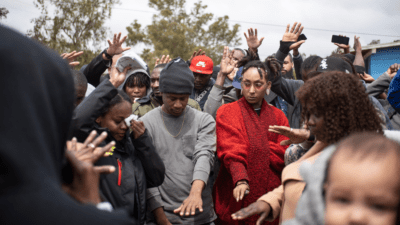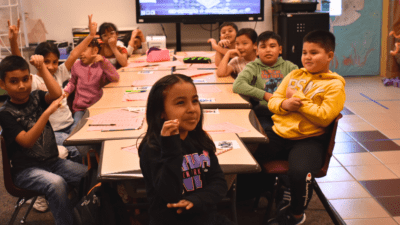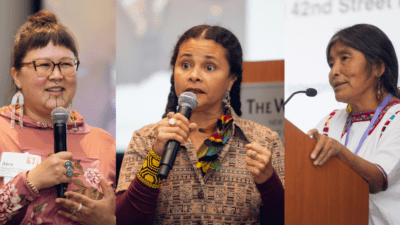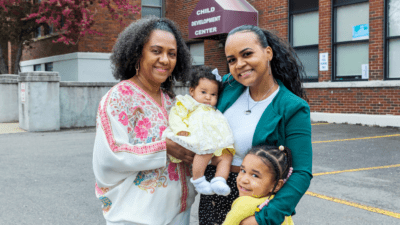A high-profile campaign for the governorship of Georgia in 2018 turned Stacey Abrams into a household name. To date, a Black woman has never been a US governor, but Abrams’ service as a state representative and her on-the-ground work to defeat historic voter suppression practices drew national attention to the ongoing disenfranchisement of minority communities.
But any discerning political leader knows that a movement is more than one person – and Abrams knew the fight was about more than fair elections. With the future in mind, in 2019, Abrams founded the Southern Economic Advancement Project (SEAP) to build networks across the American South and broaden economic power, healthcare access, and environmental justice for marginalized communities and vulnerable populations. An agile team of five leaders, now headed by Sarah Beth Gehl, coordinate their work across twelve states: Alabama, Arkansas, Florida, Georgia, Kentucky, Louisiana, Mississippi, North and South Carolina, Tennessee, Virginia, and West Virginia.
To build and expand the economic power of those historically disenfranchised, the Southern Economic Advancement Project brings attention to the intersections of social and economic policy with race, class and gender. SEAP coordinates with and amplifies existing organizations and networks to offer innovative and rigorous policy support. Within SEAP’s extensive body of work is an aggregation of meticulous data gathering and research, including quarterly reports on the COVID-19 pandemic’s effect on life in the South as well as summaries of state- and nationally-focused reports on economic challenges facing marginalized communities.
SEAP’s laser focus on policy that improves the quality of life for vulnerable communities and families has proven results. A grant provided to the Student Basic Needs Coalition assisted in expanding their chapter network, helping SBNC grow from a student organization into a national nonprofit with a presence in 15 states to advocate for policies that ensure all students have an equitable college experience and graduation opportunity. Assistance from SEAP helped the Tennessee chapter of SBNC meet with their elected officials and promote legislation requiring the state’s Higher Education Commission’s executive director to reduce food insecurity at public universities; the policy passed in October 2022 and was recognized for the Ten For Tennessee award.
As part of their ongoing commitment to equitable policy, the Southern Economic Advancement Project recently released “Engagement & Equity First: Opportunities and Challenges for Federal Funding Implementation,” produced with support from the Kellogg Foundation. Federal funding in response to the COVID-19 pandemic provided a microcosm to evaluate public policy design and implementation. Interspersed with reflections from interviewees and survey participants who have experience with federal funding programs, the report offers an extensive assessment of the challenges and opportunities in federal funding implementation, with concrete and actionable steps to expand community engagement and provide equitable access.
As 2023 begins, the Southern Economic Advancement Project launched a groundbreaking tool: an American Rescue Plan Act (ARPA) spending tracker. The ARPA, a comprehensive legislative package signed in March 2021, was designed to provide relief and support to American individuals, families, small businesses, and state and local governments negatively impacted by the COVID-19 pandemic. Included in the ARPA was the development of the State and Local Fiscal Recovery Fund (SLFRF) to provide $350 billion to communities across the nation.
In response, SEAP developed a real-time data tracking dashboard of local leaders’ plans for and spending of SLFRF funds. The first phase of the dashboard focused on over 200 cities across Alabama, Georgia, Mississippi, North Carolina and Washington State. The updated dashboard expands its coverage to all American cities and counties, allowing local leaders to identify remaining opportunities and advocacy points. The dashboard tracks numerous applications of ARP funds directly related to the well-being of children, including:
- $17,000 for the Children’s School Supplies program in Pleasant Grove, Alabama, to assist parents in preparing kids for school due to the financial hardship brought on by the pandemic
- $50,000 for Babies Need Bottoms, the only diaper bank in Western NC County, to meet a 393% increase in demand
- $95,000 in Jacksonville, Alabama, for a playground with features for kids with disabilities in a low-income neighborhood
- $195,000 for Literacy Changes Life for the GOOD in Cabarrus, North Carolina, through academic mentoring, sound after-school tutoring, STEM mentoring, summer learning and early learning programs, expected to reach up to 150 families
- $310,000 in Alexandria, Virginia, to support enhanced enrichment opportunities for children in the Out of School Time Program after school and summer programs
- $500,000 for rental assistance in Cumberland County, North Carolina, to help families with an annual income of 80% or less of the county’s median income
- $1.5 million for Guilford County, North Carolina’s Ready for School, Ready for Life, a program preparing kids and families for kindergarten, to support service navigators in each OB/GYN and pediatric practice in the county
Cities and counties have until December 31, 2024 to budget the funds, so there’s still time to make a difference. Find out how much money is still on the table in your community through the SEAP Tracker and make sure local leaders know how these funds can improve child well-being in your community.
Read More about the Southern Economic Advancement Project
- Southern Economic Advancement Project, “The SEAP Story”
- Every Child Thrives, “A revitalized dashboard for tracking ARPA funding”
- Every Child Thrives, “Lessons from SEAP: advancing equity in federal funding implementation”








Comments